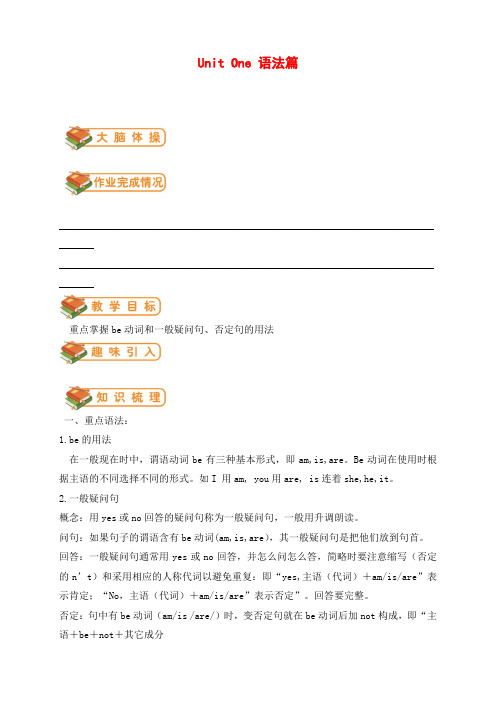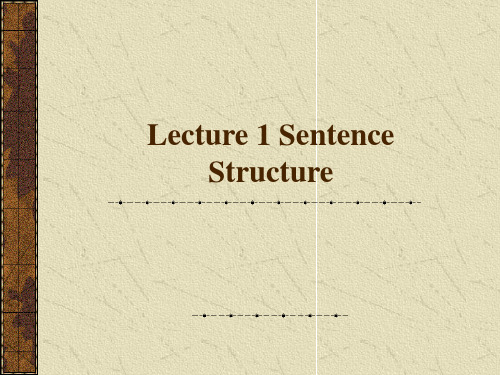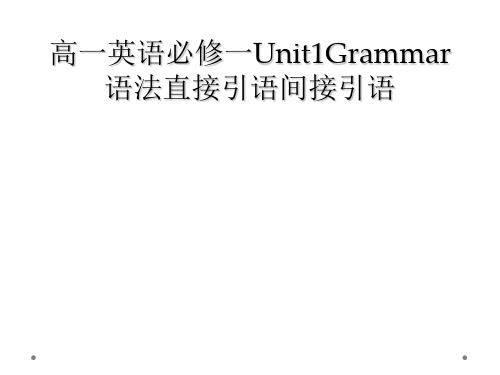Unit1语法篇
六年级上英语——第一单元语法篇

1 Unit1(语法篇) 学生姓名___________ 学 科_________ 年 级_____________ 教师姓名___________ 平 台_________ 上课时间_____________
1. 通过对一般现在时和一般过去时的类比,更好的巩固本单元知识。 2. 通过对学生的视觉刺激,促进学生对重点语法知识的有效记忆 3. 通过视觉类比法,引导学生建构学科知识体系,激发解决相关问题的潜能
(25分钟) 回顾旧知识 1.一般过去时的功能
1)表示在过去时间里发生的动作或存在的状态。 常与表示过去的时间状语连用,如:a few minutes ago, yesterday, last Sunday 等以及由连词when 等引导的时间状语从句。 (1)He was here just now . (2)Dinosaurs died out about 65 million years ago. 2)表示过去经常或反复发生的动作。 可与时间状语often连用;used to (过去常常)加动词原形或would(总是、常常)加动词原形也表示过去经常、反复发生的动作。 (1)When I was a boy ,I often went to play in the park. (2)He used to smoke. (3)When Li Ping was young ,he would work on the farm.
探索新知识 2.一般过去时的构成 一般过去时用动词的过去式表示。规则动词的过去式是在原形后加-ed或-d,词尾读音分别为/ t / ,/ d / ,/ id / 。规则如下: 规则 动词原形 过去式及词尾读音 2
注: 不规则动词的过去式各不相同,要逐一熟记。 例如: be : am/ is - was are -were do-did go -went take-took see-saw write-wrote buy-bought send-sent get-got sell-sold teach-taught fly-flew drive-drove
北师大版初一(上)英语第2讲:Unit One 语法篇(学生版)

Unit One 语法篇___________________________________________________________________________ __________________________________________________________________________________ _______重点掌握be动词和一般疑问句、否定句的用法一、重点语法:1.be的用法在一般现在时中,谓语动词be有三种基本形式,即am,is,are。
Be动词在使用时根据主语的不同选择不同的形式。
如I 用am, you用are, is连着she,he,it。
2.一般疑问句概念:用yes或no回答的疑问句称为一般疑问句,一般用升调朗读。
问句:如果句子的谓语含有be动词(am,is,are),其一般疑问句是把他们放到句首。
回答:一般疑问句通常用yes或no回答,并怎么问怎么答,简略时要注意缩写(否定的n’t)和采用相应的人称代词以避免重复:即“yes,主语(代词)+am/is/are”表示肯定;“No,主语(代词)+a m/is/are”表示否定”。
回答要完整。
否定:句中有be动词(am/is /are/)时,变否定句就在be动词后加not构成,即“主语+be+not+其它成分语调:语调,即说话的腔调,就是一句话里声调高低抑扬轻重的配制和变化.世界上没有一种语言是用单一的声调说出的,以英语为例,英语有五种基本语调:升调(↗)、的降调(↙)、的升降调(∧)、的降升调(∨)以及平调(→)。
大部分的一般疑问句都应读作升调(↗),并落在最后一个单词身上;而一般疑问句的简略回答用降调(↙)。
1.We are from the country.(改为一般疑问句) _________ __________from the country?2.Miss Li is an English teacher.(改为否定句) Miss Li_________ __________an English teacher.3.My name is Sally.(对划线部分提问) ________ _________ __________name?4.Is he Daniel?(作否定回答) No,__________ ____________.5.She is Li Fang.(改为同义句) _________ ___________ __________Li Fang.基础演练一、单选。
大学英语语法 unit 1 Sentence Structure

Ex: explain the meanings of the prefixes and suffixes in the following words: astir, awhir, deplane, disambiguate, ecocide, megajet, mini-budget, nonnovel, outsmart, supertax, anti-Marketeer cinerama, meritocrat, interviewee, racketeer, topsider, gangsterese, hawkish, narrowish, nuclearism, golfitis, beatnik, protestnik, dopester, huckster, weatherwise.
stem– is any morpheme or combination of morphemes to which an affix can be added.
Ex: analyze the following words and show how many morphemes each of them contains: specialize, pretentious, unsympathetic, crudity, indisputable, individuality, halfhearted, bird’s-eye, gaslight, backburner, officer-in-charge, a man of letters, downfall, dining-room, power-drunk.
大学英语写作课程语法Unit 1 语法和练习答案

第一单元语法部分参考答案PART III GRAMMARSubject- Verb AgreementWhen the subject is compoundReference for the Classroom ActivitiesSummary:1. A compound subject with and takes a plural verb in most cases, but when itexpresses a singular meaning or when each of the singular subjects is considered individually, it takes a singular verb.2.After a compound subject with or, nor, either…or, neither…nor, not …but,theverb agrees in number and person with the nearer part of the subject.3.Intervening phrases or clauses not introduced by coordinating conjunctions do notaffect the number of a verb. Such phrases are normally introduced by prepositions or prepositional phrases such as well as, as much as, rather than, along with in addition to, together with, with, plus, and including.When the subject expresses quantityReference for the Classroom ActivitiesAll the sentences are correct.Summary:1.Nominal phrases of time, money, weight and measurement normally take asingular verb.2.Some words or phrases, such as all, most, alf, the last, the rest, take a singular orplural verb, depending on the meaning of the noun or pronoun that follows.3.Phrases lik e lots of, heaps of , loads of take singular or plural verbs depending onthe form of the nouns that follow.4.In sentences with more than one or many a modifying the subject nouns, the verbshould take a singular form though it is plural in meaning.When the subject is a relative pronoun, a what-clause, or in the there-be structureReference for the Classroom Activitiesa. He was one of the candidates who were able to carry out their campaign pledges.He was the only one of the candidates who was able to carry out his campaign pledgesb. What he wants is just a little love from his foster parents.What one thinks and says are not always the same.c. There is a cherry tree and several orchid flowers in the garden.There are hundreds of applicants on the waiting list for the job.Summary:1.After a relative pronoun (who, which, that), the verb has the same person andnumber as the antecedent. (In the second sentence in Pair a, the antecedent is the only one, not the candidates.)2.After a what-clause, the verb is usually singular,. But if the what-clause is in acompound structure plural in meaning, the verb is in plural form.3.In the there-be structure, the verb is singular or plural depending on the number ofthe subject. The singular there is may be used to introduce a compound subject when the first noun or nominal phrase is singular.OthersReference for the Classroom Activitiesa. Nobody in town admits seeing him.b. Does anyone want to go with me?c. Are any of you going to the exhibition?d. None works/work so hard as he does.e. Books are her chief source of enjoyment.f. The one thing you must be ready for is their attempts to break up the meetingg. The jury is finally complete.h. The jury were divided in their Opinions.i. New York Times is his bible.j. Semantics is the study of meanings.Summary:1.Indefinite pronouns such as anybody, anyone, each, everybody, nobody, no one,and somebody generally require a singular verb.2.The pronouns any and none take either singular or plural verbs.3.The complement of the verb be does not affect its number.4. A collective noun takes a singular verb when the class it names is thought of as aunit, but a plural verb when the members of the class are thought of as individuals.5.Titles of books, magazines, movies, newspapers, plays, and the like take asingular verb.6.Certain nouns which are plural in form but singular in meaning generally take asingular verb. Some of these are physics, mechanics, news, statistics,and whereabouts.PART V FOLLOW-UP EXERCISES1. a. The little boy was chicken-hearted.b. That statesman is a respectable figure in the political arena.c. We sat down by the oak tree, enjoying the breeze coming from the laked. We need to drink the milk before it sours.e. The child had difficulty finding his way to school.f. The young woman received a lot of flowers and gifts.g. My father drew back the curtain a little lest I see him.h. Our university can accommodate 4,000 students.i. Social custom s vary greatly from country to country.2. The writer's attitude changes from negative to positive in each pair of sentences3. (1)experienced (2) elapsed(3)attempting (4) with(5)take up (6) made(7)endeavor (8) true4. a. The state attorney said that the man would be prosecuted.b. We suppose that a referee should be disinterested but not uninterestedc. Tony can hit a ball farther than I can.d. We must pursue this matter further.e. The principles behind our constitution are a principal reason for its astounding success.f. Al1 the band instruments except the tuba will be carried to the auditorium for the music contest.g. The federal government comprises the legislative, judicial, and executive branchesh. The whole region was struck by an economic disaster.i. (correct)j. He was awaked to the risk.5. My sister Lulu accepted a scholarship to study in the UK. She had done very well in school and the principal thought that living with a British family would teach her a lot. Mother said she would let her go if she bought a box of stationery and promised to write home every week. She said that she would live up to her promise and she always does pretty well in living up to her principles. Soon after she arrived in the UK., she adapted to her new environment. Her new life did not affect her a great deal. She knew that as a student she had to be economical and she was not self-conscious of her poor clothing and strange accent. These were the things she was uninterested in; what fascinated her instead was the cultural differences between the two countries. She found people there liked to pay compliments and were more credulous to what she said. Of course, she never lied to them about her motherland. Though she experienced cultural shocks continually, she developed a fair attitude towards the other culture. In the proceeding years, she settled down in the UK. and became a person with an alternative cultural identity.6. a. Sixty hours is the amount of work time I contracted for.b. The jury is expected to reach its decision very quickly.c. Each of the candidates for the position has exceptionally high qualifications.d. Every boy and girl in the sixth grade was/is eager to win the contest.e. Corn bread and milk is a popular breakfast in the rural South.f. The instructor as well as the students was at fault.g. He is one of the students who plan to attend the speech contest.h. The jury are to be isolated in individual hotel rooms each night during the triali. Sam sprawled in the chair and knocked over one of the lamps which were on displayj. The symptoms of mercury poisoning vary with each individual case.k. He believes that athletics improves school morale.l. Up goes the starter's gun, and each of the runners becomes tense.m. Either The Times or The Tribune is a reliable source of news.n. The first thing that catches your eye is the headlines.o. She is one of the women who have made this country what it is.。
高一英语必修一Unit1Grammar语法直接引语间接引语

仍用一般现在时。例如: Teacher said to us:" The moon moves round
the earth." Teacher told us the moon moves round the earth. The teacher said to us : “Light travels faster
宾语从句
判断以下哪些句子属于间接引语
She said that she didn’t want to be a teacher. 间接 She said, “I don’t want to be a teacher〞.直接 He said, “ I like playing football〞. 直接 He said that he liked playing football. 间接
3. Mr Black said, “I have walked a long way this week.〞 Mr Black said that __ a long way __. A. I had walked…last week B. he had walked…that week C. I walked…last week D. he has walked…this week
〞 • 间接引语 Mum told me that I could clean my bedroom the next day . • Mr. Smith said,“He is a good worker. ’’ • Mr. Smith said that he was a good worker.
3.人称的变化
• 直接引语里的第一人称和第二人称,变间接引语时,人称要做相 应调整。例如:
人教版八年级上册英语第一单元unit1 语法

Where did you go on vacation? Did you go out with anyone?
Did you buy anything special?
一般疑问句
Was he at home yesterday?
Did she go to Beijing last week?
一般疑问句 的肯定回答
一般疑问句 的否定回答
Yes, he was. No, he was not(wasn't).
Yes, she did. No, she didn't.
… ………………………… … UNIT 1
carry-carried study-studied
… ………………………… … UNIT 1
UNIT 1
be动词在一般现在时中有am,is,are三种形式,意为
实意动词(行为动词)按照动词过去时变化规则进行
“是”,但在一般过去时中有was(单数)和were(复数).
变化,但在一般疑问句中需用助动词did,后接动词原形。
3. 一般过去时也表示过去经常或反复发生的动作,常和often, always等表示频度的时间状语连用。 如:
He always went to work by bus last year.
… ………………………… … UNIT 1
UNIT 1
动词规则变化
动词
类别
一般情况
以e结尾的动词
以重读闭音节结尾, 且末尾只有一个辅音
A、did, go B、are, going C、will, go D、do, you
4. —What______in the office just now?
人教版九年级全一册英语Unit1单元语法知识点总结
人教版九年级全一册英语Unit1单元语法知识点总结本单元重点短语的具体用法1. Good learners:优秀的学习者。
例如:Good learners always find ways to improve their study.(优秀的学习者总是找到方法来提高他们的学习。
)2. Work with friends:和朋友一起学习。
例如:It's better to work with friends to study.(和朋友一起学习会更好。
)3. Study for a test:备考。
例如:I need to study for the math test tomorrow.(我需要为明天的数学考试备考。
)4. Have conversations with:与……交谈。
例如:I like having conversations with my English teacher.(我喜欢和我的英语老师交谈。
)5. Speaking skills:口语技巧。
例如:Improving speaking skills requires a lot of practice.(提高口语技巧需要大量的练习。
)6. A little:有点儿。
例如:I'm a little tired today.(我今天有点儿累。
)7. At first:起初,起先。
例如:At first, I found it difficult to learn English.(起初,我发现学习英语很困难。
)8. The secret to...:……的秘诀。
例如:The secret to success is hard work.(成功的秘诀是努力工作。
)9. Because of:因为。
例如:Because of the rain, we had to cancel the picnic.(因为下雨,我们不得不取消野餐。
北师大版高一英语必修1_Unit1_单元语法详解
Unit1 单元语法详解一般现在时与现在进行时一、一般现在时1. 一般现在时主要由动词的原形表示,如果主语是第三人称单数,谓语用单数。
2. 基本用法(1)表示习惯性、经常性的动作。
常与表示频率的词或短语如always、every time、now and then、occasionally、often、seldom、sometimes、usually、once a month 等连用。
I leave home for school at 7:00 every morning.我每天早上七点从家去学校。
He often watches football matches at home.他经常在家看足球赛。
即时训练1用括号内单词的适当形式填空1. He seldom (go) to the cinema.2. -How often you (go)back to see your parents?-Once a week.答案:1. goes 从seldom看,这里表达经常性的动作。
注意主语是第三人称单数,因此谓语用单数。
2. do;go 从空前的often看,这里表达习惯性动作,因此用一般现在时。
一般疑问句是将助动词do提前。
(2)表示持久的状态、个性、性质、能力。
I love to get together with my friends.我喜欢和朋友在一起。
Wang Min writes good English but does not speak well.王敏英语写得很好,但说得不好。
即时训练2完成句子1. He (喜欢打篮球).2. Who (它属于)?3. The cloth (容易洗).4. Water (结冰)at 0℃.答案:1. likes playing basketball 此处表达某人的喜好,因此用一般现在时。
主语是第三人称单数,因此谓语用单数。
2. does it belong to 此处表达所属关系,因此用一般现在时。
人教版高中英语必修二Unit 1 语法 过去完成时(共30张PPT)
They have worked for eight hours.
By six o’clock they had worked for eight hours.
Summary
1. 现在完成时与过去完成时:两者用法 基本相同,但现在完成时是以现在时间 为基点;过去完成时则是已过去的时间 为基点,与现在无关,即表示“过去的 过去”。
• They became friends again that day. Until then, they hadn’t spoken to each other for nearly two years.
• By the time he was fourteen, Edison had set up a small chemistry lab of his own.
• I had thought you would come tomorrow.
• I had meant to help you, but I was too busy at the moment.
4. 特殊句式:
1). 用于hardly/scarcely…when…, no sooner…than…句型中,主句用过去完 成时,when和than从句里用一般过去 时。
2. 当医生到达的时候病人已 经去世了。
The patient had died when the doctor arrived.
3. 他说他以前见过你。
He said that he had seen you before.
2. 过去完成时表示从过去某一时 间开始持续到过去另一时间动作
七年级英语下册 Unit 1 Can you play the guitar(语法篇)试题 (新版)人教新目标版
Unit 1 语法篇____________________________________________________________________________________________________________________________________________________________________学生通过本讲学习,能够掌握本单元的重点语法,并在综合能力上有一定的拓展。
一、情态动词can的基本用法情态动词can有一定的词义,但不能独立存在,它必须与动词原形一起构成谓语。
情态动词can没有人称和数的变化。
其具体用法如下:1.表示"能、会",指脑力或体力方面的"能力"。
例如:I can speak English.我会讲英语。
Jim can swim but I can't.吉姆会游泳,但我不会。
2.表示"可能",常用于否定句或疑问句中,指某种可能性。
例如: Han Mei can't be in the classroom.韩梅不可能在教室里。
Can he come here today, please?请问他今天能到这里来吗?3.表示"可以",常用于口语中,指许可或请求做某事。
例如:Can I have a cup of tea, please?请问我可以喝一杯茶吗?You can go out.你可以出去了?二、情态动词的注意事项1. can的口诀:情态动词can、can、can,动词原形跟后面。
变疑问can提前,变否定not后面加上去。
主语人称单复数,情态动词不能变。
2. 情态动词can可以引导肯定句和疑问句。
(1)、肯定句:主语+ can + 动词原形+ 其他成分(2)、疑问句:can + 主语+ 动词原形+ 其他成分3.can 引导的肯定句变为疑问句的方法:(一调二改三问号)(1)、can 提前,首字母大写。
- 1、下载文档前请自行甄别文档内容的完整性,平台不提供额外的编辑、内容补充、找答案等附加服务。
- 2、"仅部分预览"的文档,不可在线预览部分如存在完整性等问题,可反馈申请退款(可完整预览的文档不适用该条件!)。
- 3、如文档侵犯您的权益,请联系客服反馈,我们会尽快为您处理(人工客服工作时间:9:00-18:30)。
Unit1语法篇 __________________________________________________________________________________ __________________________________________________________________________________
1. 熟练掌握形容词性物主代词的用法
形容词性物主代词 1. 物主代词是表示所有关系的代词,它分第一人称、第二人称和第三人称,每个人称又分单数和复数。物主代词可分为形容词性物主代词和名词性物主代词,本单元主要涉及形容词性物主代词。
2. 形容词性物主代词表 人称 第一人称 第二人称 第三人称 单复数 单数 复数 单数 复数 单数 复数
形容词性物主单词
My 我的 Our 我们的 Your 你的 Your 你们的 His 他的 Her 她的 Its
它的
Their
他/她/它们的
3. 形容词性物主代词具有形容词的特点,不能单独使用,只能修饰名词作定语,位于名词之前。 our country 我们的国家 my pen我的钢笔 his phone number他的电话号码 her first name 她的名字 4. 有时,在形容词性物主代词与名词之间还可以有形容词作修饰语,但不能使用冠词(a, an, the)或指示代词(this, that, these, those)。例如:
【误】That is his a jacket./That is a his jacket. 【正】That is his jacket. 那是他的夹克。 5. 形容词性物主代词和形容词一起修饰名词时,其顺序为:形容词性物主代词 + 形容词 + 名词。例如:
【误】It is white her ruler. 【正】It is her white ruler. 它是她的白色直尺。 【误】Is this English his book? 【正】Is this his English book? 这是他的英语书吗? 6. 注意:汉语中的“我妈妈”、“他姐姐”等表达,虽然代词用的是“我”、“他”,但要表达的意思仍是“我的”、“他的”,所以在翻译成英语时,一定要用形容词性物主代词而不能用人称代词。例如:
我妹妹很漂亮。 【误】I sister is very nice. 【正】My sister is very nice.
单项选择: 1.(2015安徽淮北五校期中联考)---Is he Tom? --- . He is Tim . A. Yes, it is B. No, it's not C. Yes, he is D. No, he isn't 2.(广西桂林中考)This is MP4. Yours is over there . A. my B. me C. I D. mine 3.(2013福州中考改编)---Jane,is this key ? ---Yes , it's mine . Thank you . A. you B. your C. yours 4.(2014北京中考)I have a big brother. name is Paul. A. His B. Her C. Its D. Your 5.(北京中考改编)The lovely(可爱的) girl is from Class6. name is Alice . A. Her B. His C. Your D. Its 6.(重庆中考)Please send best wishes to Mary . A. I B. me C. my D. mine 7.(2013山东济南中考)---Does Miss White like sports ? ---Yes, favorite sport is tennis . A. he B. she C. his D. her 解析及答案: 1. 考查一般疑问句的回答。问句主语是第三人称单数he,答语人称不变,又通过答语中的“他是蒂姆”可知,答语一定是否定形式,故选D。
2. 句意:这是我的MP4.你的在那边。空格后有名词,所以此处需用形容词性物主代词,故选A。 3. 空格后有名词key, 故用形容词性物主代词your 修饰。故选B。 4. his他的,her她的,its它的,your你的,由前句brother可知此处用“他的名字叫保罗”,故选A。 5. 空格后面的name为名词,需用形容词性物主代词修饰。句中the lovely girl表示女性,故选A。 6. I我,人称代词主格形式 ;me我,人称代词I的宾格形式;my我的,形容词性物主代词;mine我的,名词性物主代词,由空格后的best wishes可知需用形容词性物主代词做定语,故选C。
7. 根据问句中的Miss White (怀特小姐)和空格后的名词短语favorite sport可知要用形容词性物主代词her,故选D。
基础演练 一、 用方框中选择所给的单词填空,每词限用一次。 his, you, it, I, your 1. —Is this _________ pen, Mary? —Yes, it is my pen. 2. _________ name is Jack. 3. —What’s this in English? —__________ is a ruler. 4. Are __________ Jenny Smith? 5. __________ am Jack Green. 答案: 1. your 2. His 3. It 4. you 5. I 二、适当形式填空(单句适当形式) 1. My name is Linda Hand. Linda is my (one) name. 2. --- What's (she) last name? --- Smith. 3. --- (be) you Cindy? --- Yes, I am. 4. This is Tony. (his) is an English boy. 5. --- What's (you) phone number? --- It's 010558967. 答案: 1. first 2. her 3. Are 4. He 5. your 巩固提高 三、按要求转换句型 1. My last name is Zhang. (对划线部分提问) last name? 2. Her telephone number is 677-0923. (对划线部分提问) telephone number? 3. She is Mary. (改为同义句) Mary. 4. He is Frank. (改为一般疑问句) Frank? 5. Are you Bob Brown? (作否定回答) , . 答案: 1. What's your 2. What's, her 3. Her name is 4. Is he 5. No, I'm not 四、翻译(根据中文提示完成句子) 1. 你的直尺是棕色的吗? ruler brown? 2. 他的姓是什么? his name? 3. 这不是艾伦的电话机。 This Alan's . 4. 格林女士有一位好朋友。 Ms. Green has good . 5. 她也健康。 is fine, . 答案: 1. Is, your 2. What's, last 3. isn't, telephone/phone 4. a, friend 5. She, too
一、单项选择 1. That is _______ map. A. I B. my a C. a my D. my 2. _______ name is Tina. _______ is a student. A. She; She B. Her; She C. She; Her D. Her; Her 3. I _______ Gina and she _______ Jane. A. am; is B. am; are C. is; is D. is; am 4. _______ name is Eric and _______ name is Mary. A. Her; his B. Her; her C. His; her D. His; his 5. ---What’s _______ name? ---_______ name’s Gina. A. your; I B. you; I C. you; My D. your; My 6. ---Is his phone number 330-9086? ---________. It’s 303-9086. A. Yes, he is B. No, he isn’t C. Yes, it is D. No, it isn’t 7. ---Is it ________ telephone number? ---Yes, it is ________ telephone number. A. my; your B. your; my C. his; her D. her; his 8. --- What's your name? --- Tom Brown. A. I B. My is C. I'm D. My name 9. name is Gina. is in China. A. She; Her B. Her; She C. He; His D. His; He 10. --- What's his car number? --- 6828. A. His B. He's C. It's D. He 答案:1-5 DBACD 6-10 DBCBC 二、完形填空 1 morning! Nice 2 you! 3 name is Alice Miller. My 4 name is Miller. And my 5 name is Alice.
I have a good friend. 6 name is Wang Xiaomei. Her 7 name is Wang and her first name is Xiaomei. 8 is a Chinese girl (中国女孩). She has a brother (有一个弟弟). 9 name is Wang Xiaolong
